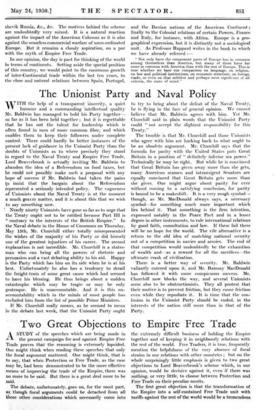The Unionist Party and Naval Policy
WITH the help of a transparent sincerity, a quiet humour and a commanding 'intellectual quality Mr. Baldwin has managed to hold his Party together— so Tar as it has been held together.; but it is regrettable that he has not the talent for leadership which is often found in men of more Cornmon fibre, and which enables them to keep their followers under complete control. There could hardly be better instances of the preSent la'c'k of guidance iii - the Unionist Party than the doubts of Unionists as to where precisely they stand in regard to the Naval Treaty and Empire Free Trade. Lord Beaverbrook is actually inviting Mr: Baldwin to abandon the -idea of a Referendum on food taxes, but he could not possibly Make such a proposal with any hope of success • if Mr. Baldwin had taken the pains to insist that - the bargain about . the Referendum represented a seriously intended policy. The vagueness of Unionists about the Naval Treaty is at the moment fi much graver matter, and it is about this that we wish to say something now.
• Nearly ninety Unionists have gone so far as to urge that the Treaty ought not to be ratified because Part III is " contrary to the interests of the British Empire." In the Naval debate in the. House of Commons on Thursday, May 15th, Mr. Churchill either totally misrepresented the wishes of the majority of his Party or did himself one of the greatest injustices of his career. The second explanation is not incredible. Mr. Churchill is a states- man who can bring all the powers of rhetoric and persuasion and a vast debating ability to his aid. Happy is the 'Party which has him on its side when he is at his best. Unfortunately he also has a tendency to -derail the freight-train of some great cause which had seemed to have his blessing. He thus brings about a sudden catastrophe which may be tragic or may be only grotesque. He is unaccountable. And it is this un- accountability which in the minds of most people has excluded him from the list of possible Prime Ministers.
If- Mr. Churchill really means, as he seemed to mean in the debate last week, that the Unionist Party ought to try to bring about the defeat of the Naval Treaty, he is flying in the face of general opinion. We cannot believe that Mr. Baldwin agrees with him. Yet Mr. Churchill said in plain words that the 'Unionist Party could " not accept the slightest responsibility for this Treaty."
The trouble is that Mr. Churchill and those Unionists who agree with him are harking back to what ought to be an obsolete argument. Mr. Churchill says that the formula for parity with the United States puts Great Britain in a position of " definitely inferior sea power." Technically he may be right. But while he is convinced that Great Britain has given away more than she gets, many American seamen and intransigent Senators are equally convinced that Great Britain gets more than she gives. One might argue about parity for ever without coining to a satisfying Conclusion, for • parity is bouhd to be a makeshift. It is a very rough symbol-L- though, as Mr. MacDonald always says, a necessary symbol—for something much more important whiCh lies behind it. That something is the firm intention; expressed notably in the Peace Pact and in a lesser degree in Other instruments, to rule international relations by good faith, consultation and la.W. If these- fail there. will be no hope for the world. ' The vile alternative is a return to the old idea of snatching national security out of a competition in navies and armies. • The end of that competition would undoubtedly be the exhaustion of -wealth and=as a reward for all- the sacrifices—the ultimate crash of civilization. ' - There is a better way of security. Mr. Baldwin valiantly entered upon -it, and Mr. Ramsay MacDonald' has followed it - with more conspicuous success. Mr. Churchill now blocks the way, and several Unionists seem also to be obstructionists. They all protest that their motive is to prevent friction, but they cause friction even 'while they repudiate it. It is time that the con- fusion in the Unionist Party should be ended, in the interests of the nation still more than in that of the Party.






































 Previous page
Previous page